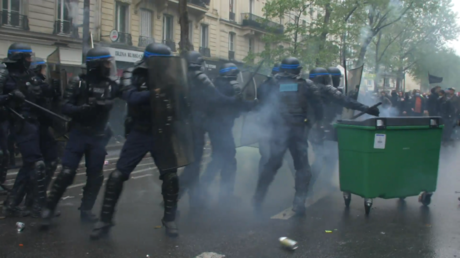
Violent clashes erupted across the country as part of continuing demonstrations against controversial pension reforms
Almost 300 French protesters were arrested during massive Labor Day demonstrations against controversial pension reforms, and more than 100 police officers were injured during the unrest, according to local authorities.
On Monday, French Interior Minister Gerald Darmanin said police had detained a total of 291 people nationwide, 111 of whom were arrested in Paris. He noted that at least 108 officers had been wounded, a figure he described as “extremely rare” for a protest on May 1.
In the French capital alone, a total of 25 officers were injured, with one suffering serious burns to the face and hands after being hit by a Molotov cocktail, the minister said.
Darmanin put the total number of people who attended protests across the country at 782,000. However, the CGT trade union disputed this figure, claiming that almost 2.3 million people took to the streets nationwide.
While many demonstrations were peaceful, violent clashes erupted between police and demonstrators in some locations, according to footage shared on social media. Protesters threw projectiles and petrol bombs at police, who responded by using water cannons and tear gas.
The violence was condemned by the French authorities, with Prime Minister Elizabeth Borne saying that, while Labor Day was “a moment of responsible mobilization and commitment,” “the scenes of violence on the sidelines of the processions are all the more unacceptable.”
Meanwhile, Darmanin claimed the violence had been fueled by far-left groups known as “black blocks.” He said police had faced “extremely violent thugs who came with one objective: to kill cops and attack the property of others” in Paris, Lyon and Nantes.
France has been reeling from massive protests for several months, which were triggered by French President Emmanuel Macron’s plan to raise the retirement age from 62 to 64 in order to ease the burden on the nation’s finances. Macron signed the reform into law in April after invoking special constitutional powers to bypass the National Assembly, France’s lower house of parliament, without a vote.




